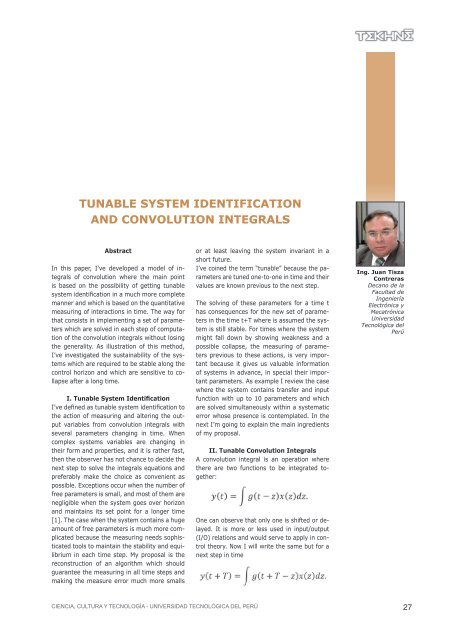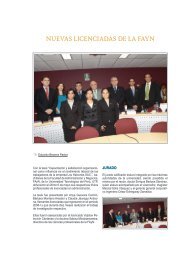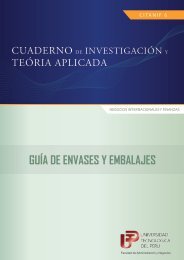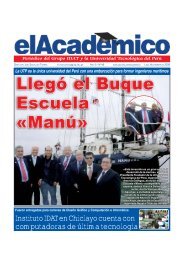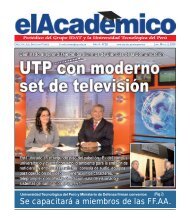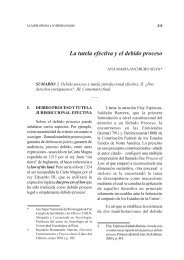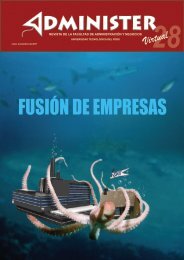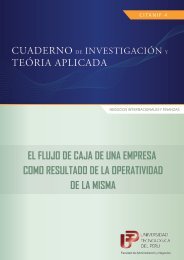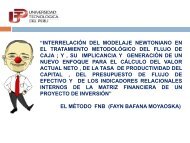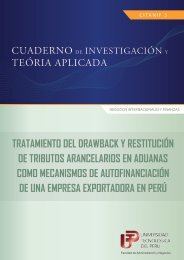Descargar - UTP
Descargar - UTP
Descargar - UTP
Create successful ePaper yourself
Turn your PDF publications into a flip-book with our unique Google optimized e-Paper software.
TUNABLE SYSTEM IDENTIFICATION<br />
AND CONVOLUTION INTEGRALS<br />
Abstract<br />
In this paper, I’ve developed a model of integrals<br />
of convolution where the main point<br />
is based on the possibility of getting tunable<br />
system identification in a much more complete<br />
manner and which is based on the quantitative<br />
measuring of interactions in time. The way for<br />
that consists in implementing a set of parameters<br />
which are solved in each step of computation<br />
of the convolution integrals without losing<br />
the generality. As illustration of this method,<br />
I’ve investigated the sustainability of the systems<br />
which are required to be stable along the<br />
control horizon and which are sensitive to collapse<br />
after a long time.<br />
I. Tunable System Identification<br />
I’ve defined as tunable system identification to<br />
the action of measuring and altering the output<br />
variables from convolution integrals with<br />
several parameters changing in time. When<br />
complex systems variables are changing in<br />
their form and properties, and it is rather fast,<br />
then the observer has not chance to decide the<br />
next step to solve the integrals equations and<br />
preferably make the choice as convenient as<br />
possible. Exceptions occur when the number of<br />
free parameters is small, and most of them are<br />
negligible when the system goes over horizon<br />
and maintains its set point for a longer time<br />
[1]. The case when the system contains a huge<br />
amount of free parameters is much more complicated<br />
because the measuring needs sophisticated<br />
tools to maintain the stability and equilibrium<br />
in each time step. My proposal is the<br />
reconstruction of an algorithm which should<br />
guarantee the measuring in all time steps and<br />
making the measure error much more smalls<br />
CIENCIA, CULTURA Y TECNOLOGÍA - UNIVERSIDAD TECNOLÓGICA DEL PERÚ<br />
or at least leaving the system invariant in a<br />
short future.<br />
I’ve coined the term “tunable” because the parameters<br />
are tuned one-to-one in time and their<br />
values are known previous to the next step.<br />
The solving of these parameters for a time t<br />
has consequences for the new set of parameters<br />
in the time t+T where is assumed the system<br />
is still stable. For times where the system<br />
might fall down by showing weakness and a<br />
possible collapse, the measuring of parameters<br />
previous to these actions, is very important<br />
because it gives us valuable information<br />
of systems in advance, in special their important<br />
parameters. As example I review the case<br />
where the system contains transfer and input<br />
function with up to 10 parameters and which<br />
are solved simultaneously within a systematic<br />
error whose presence is contemplated. In the<br />
next I’m going to explain the main ingredients<br />
of my proposal.<br />
II. Tunable Convolution Integrals<br />
A convolution integral is an operation where<br />
there are two functions to be integrated together:<br />
One can observe that only one is shifted or delayed.<br />
It is more or less used in input/output<br />
(I/O) relations and would serve to apply in control<br />
theory. Now I will write the same but for a<br />
next step in time<br />
Ing. Juan Tisza<br />
Contreras<br />
Decano de la<br />
Facultad de<br />
Ingeniería<br />
Electrónica y<br />
Mecatrónica<br />
Universidad<br />
Tecnológica del<br />
Perú<br />
27


